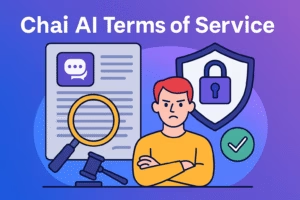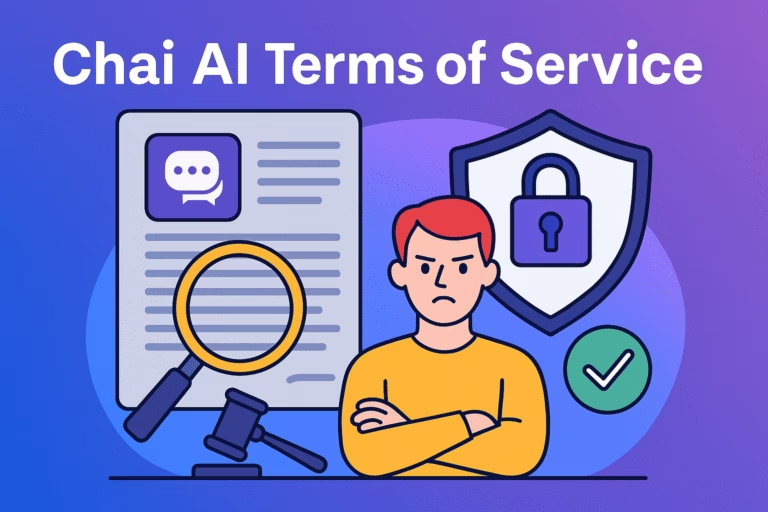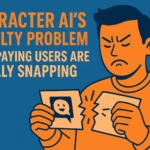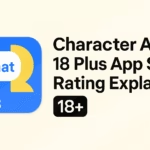Key Takeaways
- Chai AI Terms of Service grants the platform an irrevocable and perpetual license over user content, including resale, derivatives, and sublicensing.
- Moral rights waiver matters since it allows modification without credit and without regard for author reputation.
- Ownership language can be misleading since you keep the title but surrender practical control through broad licensing.
- Protect your work by keeping original characters off hosted chat platforms and by treating cloud inputs as public.
- Use local tools such as SillyTavern or self hosted LLMs so your text never leaves your device.
- Back up everything and export drafts often so your canon lives outside any app.
- Read and save TOS snapshots so you can track changes and make informed choices.
- Consider privacy first options for companion style chats, such as Candy AI, when you want control and clarity over data use.
Creator checklist
2. Host locally when possible
3. Keep dated copies of TOS
4. Export and version your characters
5. Share warnings with your community
Imagine spending months breathing life into a set of characters. You write their backstories, their flaws, their voices. They become part of you. Then one morning, you open a legal document and realize they are no longer yours.
You did not sell them. You did not give them away. You just clicked “I agree” on a Terms of Service that quietly took everything.
That is what happened to one creator on Reddit who used Chai AI as a playground for storytelling.
They discovered that every piece of text they had ever typed into the app – every character, every scene – now belongs to Chai AI in all the ways that matter.
The company’s legal document is simple but devastating. It states that anything you post grants Chai an irrevocable, perpetual, worldwide license to use, sell, modify, and profit from your work forever.
The creator described the moment like a kind of creative death. Their original characters are still alive on the app, but they no longer belong to them. It is ownership without agency, authorship without rights.
The company can now remix, resell, or even distort those creations without asking permission or offering credit.
This discovery hit the community hard. Writers, roleplayers, and artists who use chatbots as creative companions began asking the same question. If the cost of innovation is the loss of creative ownership, is the trade still worth it?

The Hidden Trap in the Fine Print
Legal language has a strange talent for sounding harmless. Phrases like “You retain ownership of your content” sound protective, even comforting. But buried inside Chai AI’s Terms of Service is the real deal: you may own your words in name, but the company owns the right to do anything with them.
Here is what that means in plain language. When you type something into Chai, you give the company a license that never expires. You cannot revoke it, even if you delete your account.
That license allows Chai to use your creations for anything – advertisements, derivative stories, or even third-party sales. They can modify your characters, resell them, or pass them to partners without ever needing your approval.
The most chilling part is the waiver of moral rights. In creative law, moral rights protect the link between the author and their work. It is what stops a company from rewriting your story into something offensive or absurd while still using your name. Chai’s Terms remove that safeguard completely.
They also reserve the right to sublicense your content, meaning they can let other entities profit from your creations.
You are not just sharing ideas; you are feeding a machine that can package and sell your imagination under another label.
It is not an accident. The phrasing is intentional, written to create a legal shield that allows full control while appearing friendly on the surface.
It is the oldest trick in the digital world: tell users they keep ownership, then take away everything that makes ownership matter.
The Bigger Picture; Why This Hurts More Than It Seems
On the surface, this might look like a niche problem – one company’s questionable policy. But for many creators, the Chai AI Terms of Service have exposed something far larger. It is not just about chatbots; it is about the widening gap between creators and the platforms they depend on.
Writers once feared piracy. Now they fear participation. Every time they upload their work to an AI platform, they are gambling with ownership. The moment those words touch the server, they stop being entirely theirs.
Some authors compare it to the early days of social media, when posting art online meant watching it spread without credit. The difference now is that platforms have turned that loss into a legal feature.
The frustration echoes across communities. In the Reddit thread, a novelist joined the conversation and reminded AI enthusiasts that this pattern has existed for years.
She explained how millions of writers had their published and unpublished books scraped to train AI systems without consent or payment. The law called it legal. The artists called it theft.
That is the painful symmetry. The same people who enjoyed playing with AI are now seeing their own creations swallowed by it. The cycle has folded in on itself. The technology that once felt like collaboration has become consumption.
And yet, what makes this story different is the clarity. Chai did not hide behind mystery algorithms or data leaks. It spelled out its intent right in the open. The exploitation is legal, explicit, and permanent.
It forces every creator to ask a hard question: when ownership can be redefined in a sentence, what does authorship even mean anymore?
The Fallout; How Creators Are Reacting
The backlash has been raw and immediate. Reddit’s creative communities are filled with posts from users deleting their Chai accounts, exporting what little they can, and warning others not to repeat their mistake.
What started as a single cautionary post has turned into a public reckoning with how these platforms treat user-generated art.
Many users admit they did not read the Chai AI Terms of Service until it was too late. Some say they assumed “ownership retained” meant what it sounded like. Others believed Chai would at least respect their moral rights.
When the truth surfaced, disbelief quickly turned to anger. For those who spent hundreds of hours writing intricate backstories or building entire universes, the loss felt personal.
But anger was not the only response. A growing number of users have decided to take their creativity elsewhere. Some have migrated to local models like SillyTavern, where data never leaves their device.
Others now host open-source LLMs on personal computers to keep full control of their writing. In private Discord servers, creators have begun compiling lists of platforms with ethical data policies.
A few tried contacting Chai’s support team for clarification but were met with silence or generic responses. The lack of transparency only deepened mistrust. Even users who once defended the app are reconsidering whether convenience is worth the cost of control.
The conversation has also sparked self-reflection across the AI community. People are realizing that the promise of “free” AI tools often hides an invisible price tag. In Chai’s case, the price is authorship itself. And once you pay it, there is no refund.
The Ethical Lens; Where the Line Was Crossed
At its heart, the outrage over the Chai AI Terms of Service is not just about legality; it is about ethics. The company followed the law to the letter, yet broke the unspoken contract between platform and creator. Consent built on confusion is not consent at all.
Chai’s document tells users they “retain ownership” while simultaneously removing every power that ownership implies. This is a linguistic sleight of hand that relies on most people never reading beyond the headline.
It is the digital equivalent of signing a lease for your home, only to discover the landlord has a spare key and can rent your bedroom to strangers.
When a platform claims rights to resell or modify user creations, it transforms from a creative tool into a content mine. The words you pour into it stop being art and start being data. That shift changes the moral balance. A creative exchange becomes extraction.
The most concerning part is the erosion of trust this creates in the broader AI ecosystem. If creators believe every platform will eventually monetize their work, they stop creating altogether or retreat to closed systems.
Innovation stalls, not because people lack ideas, but because they no longer feel safe sharing them.
Transparency could have prevented this. A simple, plain-language notice stating “Your work may be used for commercial purposes by us and our partners” would have been honest.
Instead, users were handed a wall of legalese that hid a rights grab behind polite phrasing.
This is where Chai crossed the line.
Not in breaking the law, but in betraying the spirit of creativity that made people join in the first place.
When artists feel tricked instead of valued, no update, feature, or marketing campaign can rebuild that trust.
Workarounds; Protecting Yourself and Your Work
The damage may already be done for some creators, but that does not mean everyone else is powerless. The first step is awareness. The second is discipline. Protecting your original characters and stories in an AI-driven world begins with knowing exactly where your words live and who controls them.
Here are a few practical ways to keep your work safe without giving up the benefits of creative AI:
1. Treat hosted AI platforms as public spaces.
Anything typed into a cloud-based chatbot should be considered public by default. If you would not post it on a social forum, do not give it to an AI platform. That includes your characters, stories, and private creative projects.
2. Use local or privacy-first setups.
Tools like SillyTavern or local large language models let you run AI completely offline. Nothing leaves your computer, which means no platform can claim ownership of what you write. It is slower and less convenient, but you control everything — data, context, and outcomes.
3. Read and save every Terms of Service update.
Do not skim them. Companies quietly change their policies all the time. Take screenshots or archive copies of old terms before agreeing to new ones. That documentation may help you later if the platform’s actions are ever questioned.
4. Keep backups outside the app.
Never rely on a chatbot or platform to store your creative work. Export everything regularly to local files or cloud storage under your control.
5. Choose ethical alternatives.
If you still want to experiment with AI companions, pick platforms that value privacy and consent. Candy AI, for example, is designed with user control in mind and avoids exploitative data policies. You can chat, create, and customize without signing away ownership.
These steps do not guarantee total protection, but they shift power back to where it belongs – in your hands. Every writer, artist, and creator who demands better standards helps reshape the future of AI toward transparency and respect.
The Shift; Where Creators Are Moving
After the Chai AI Terms of Service fiasco, a quiet migration has begun. Creators are packing up their characters, stories, and long-running worlds, taking them to safer, smaller spaces where control still means something.
One major destination is SillyTavern, the open-source favorite of writers who value privacy. Because it runs locally, users can experiment with character dialogue or story arcs without a single line leaving their machine.
Others are embracing hybrid setups using open models like Mistral or Llama, fine-tuned with local data. The appeal is simple — no hidden licenses, no buried clauses, no surrendering moral rights.
Some creators have also found sanctuary in smaller, ethical AI projects that build trust through transparency. These platforms publish clear, readable policies and refuse to store user data long-term. They may lack the polish of big tech tools, but they offer peace of mind that your creative world stays yours.
And then there is Candy AI a rising name for users who want to enjoy humanlike conversations without feeding a corporate data engine. Unlike Chai, Candy AI does not claim ownership of your messages or characters.
You can build, delete, or modify without worrying that your creations will be repurposed into something you never approved.
The migration away from Chai is more than a protest. It is a cultural shift. People are learning that convenience cannot be the only metric for choosing a creative partner.
They want platforms that respect the human element in creativity. Trust has become the new feature, and privacy the new premium.
The Wake-Up Call; The Real Price of “Free”
It always starts the same way – a shiny app, a promise of connection, a little dopamine loop disguised as creativity. Platforms like Chai AI hand users a playground and call it free. The catch is buried in fine print. You are not paying with money, you are paying with authorship.
When creators upload their worlds, they believe they are feeding imagination. In truth, they are feeding infrastructure. Every prompt becomes data. Every reply becomes training material.
The collective creativity of millions becomes fuel for a product that none of them truly own. That is the real cost hiding behind the word “free.”
The Chai AI Terms of Service simply made the invisible visible. It forced everyone to confront the uncomfortable truth that ownership online has always been fragile.
Once your story lives on someone else’s server, it can be reshaped, resold, or repurposed. The platform gets stronger, and the creator fades into the background.
But awareness is a kind of power. The same users who once clicked “accept” without thinking are now reading every line. They are teaching each other how to host locally, how to choose privacy-respecting models, how to push back with knowledge instead of outrage.
That shift matters more than any single app update or public apology ever could.
If there is one lesson here, it is this: the next generation of creators will not just make art, they will defend it. And that defense begins with knowing what “I agree” really costs.


